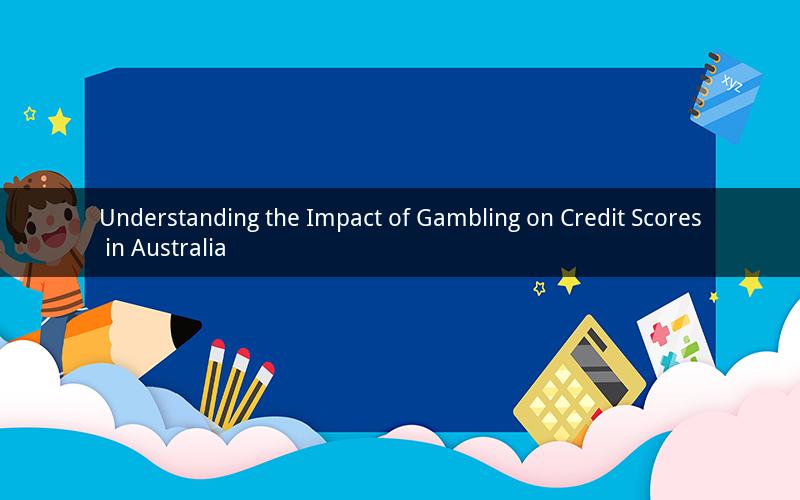
In Australia, gambling is a widely practiced form of entertainment. However, many people are unaware of the potential impact gambling can have on their credit scores. This article delves into how gambling affects credit scores in Australia, providing insights into the relationship between gambling activities and financial standing.
Gambling and Credit Scores: A Closer Look
1. Definition of credit score:
A credit score is a numerical representation of an individual's creditworthiness, which is used by lenders to assess the risk associated with granting credit. It reflects a person's credit history, including payment habits, outstanding debts, and credit utilization.
2. The role of credit score in lending:
Credit scores play a vital role in the lending process. Lenders use these scores to determine whether to offer credit and at what interest rates. A higher credit score generally translates to better loan terms and lower interest rates.
3. How gambling can affect credit scores:
a. Borrowing to fund gambling activities:
One of the most direct ways gambling can impact credit scores is through borrowing. Individuals who borrow money to fund their gambling habits may accumulate debt, leading to increased credit utilization and potentially lower credit scores.
b. Defaulting on loans or credit card payments:
If a person defaults on loans or credit card payments resulting from gambling debts, their credit score may suffer significantly. Late payments, defaults, and charge-offs can negatively impact credit scores, making it harder to obtain future credit.
c. Inquiry on credit report:
Every time a person applies for credit, the lender performs a hard inquiry on their credit report. Multiple inquiries within a short period can temporarily lower a credit score. If a person applies for multiple loans or credit cards to fund their gambling, their credit score may be adversely affected.
4. Other factors affecting credit scores:
a. Credit utilization:
Credit utilization refers to the percentage of credit a person is using compared to their available credit. High credit utilization can negatively impact credit scores.
b. Payment history:
Payment history is a significant factor in credit scoring. Consistently paying bills on time is crucial for maintaining a good credit score.
c. Length of credit history:
The longer a person's credit history, the better their credit score is likely to be. Individuals with longer credit histories tend to have a more established creditworthiness.
5. Ways to protect your credit score while gambling:
a. Establish a budget:
Setting a budget for gambling activities can help individuals avoid accumulating debt and keep their credit score intact.
b. Monitor credit report:
Regularly monitoring credit reports can help identify any issues that may arise from gambling-related financial activities, allowing timely action to be taken.
c. Avoid borrowing:
If possible, avoid borrowing money to fund gambling. Instead, use funds from savings or income to cover these expenses.
d. Pay bills on time:
Consistently paying bills on time is crucial for maintaining a good credit score. This includes any debts resulting from gambling activities.
e. Reduce credit utilization:
Keep credit utilization low by paying off debts regularly and not maxing out credit cards.
Questions and Answers:
1. Can winning at gambling improve a credit score?
Answer: No, winning at gambling does not improve a credit score. Credit scores are based on a person's credit history, not their winnings or losses.
2. Can a single gambling-related debt affect a credit score?
Answer: Yes, a single gambling-related debt can affect a credit score. If the debt leads to late payments, defaults, or charge-offs, it can negatively impact the credit score.
3. Does the amount of money gambled have any impact on credit scores?
Answer: The amount of money gambled does not directly affect credit scores. However, if gambling leads to accumulating debt, that debt can have a negative impact on credit scores.
4. Can credit counseling help improve a credit score after gambling-related financial problems?
Answer: Yes, credit counseling can help improve a credit score after gambling-related financial problems. Credit counselors can provide guidance on debt management, budgeting, and repayment strategies.
5. Is it possible to rebuild a credit score after gambling-related financial issues?
Answer: Yes, it is possible to rebuild a credit score after gambling-related financial issues. By taking proactive steps, such as paying off debts, reducing credit utilization, and maintaining good payment habits, a person can gradually improve their credit score over time.